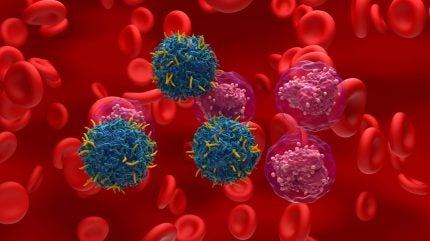

Porton Advanced Solutions and EVA Pharma have signed a memorandum of understanding (MoU) to enhance the development and manufacturing capabilities for chimeric antigen receptor (CAR) T-cell therapies at the latter’s facilities.
The collaboration will establish a platform for leukaemia and other blood cancer treatments within the Middle East and Africa (MEA).

Discover B2B Marketing That Performs
Combine business intelligence and editorial excellence to reach engaged professionals across 36 leading media platforms.
Under the MoU, both companies will focus on advancing the development and mass production of lentiviral vectors, which are essential for CAR T-cell therapies used in treating leukaemia and other cancers.
Porton Advanced will apply its knowledge in viral vector technology and CAR-T cell therapy process development to enhance EVA Pharma’s mission to provide safe, effective, and scalable cancer treatments.
EVA Pharma CEO Riad Armanious said: “Patients battling cancer deserve more than hope; they deserve access to innovations once thought out of reach.
“Together, EVA Pharma and Porton Advanced are combining our capabilities to localise innovation, at scale and with equity.”

US Tariffs are shifting - will you react or anticipate?
Don’t let policy changes catch you off guard. Stay proactive with real-time data and expert analysis.
By GlobalDataThe collaboration will combine Porton Advanced’s capabilities in manufacturing viral vectors and cell therapies with EVA Pharma’s expanding presence in the high-tech biopharmaceutical sector.
Additionally, EVA Pharma brings its infrastructure and market position across the MEA.
The joint effort is expected to facilitate technology transfers and strengthen local manufacturing capacities for cancer treatments while adhering to rigorous quality standards.
Porton Advanced CFO Andrew Chen said: “This collaboration aligns with our vision of supporting cutting-edge treatments globally accessible and further validates Porton Advanced’s unique value in facilitating global advanced therapy pipelines.”
The agreement is in accordance with international initiatives to enhance access to advanced immunotherapies, especially in regions where cell and gene therapy infrastructure is lacking.
By creating localised production facilities in Saudi Arabia and Egypt, the collaboration seeks to reduce expenses and expedite treatment durations.
Cell & Gene Therapy coverage on Pharmaceutical Technology is supported by Cytiva.
Editorial content is independently produced and follows the highest standards of journalistic integrity. Topic sponsors are not involved in the creation of editorial content.




